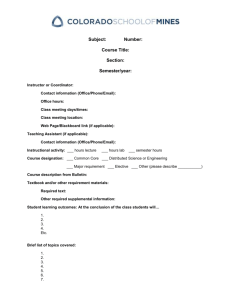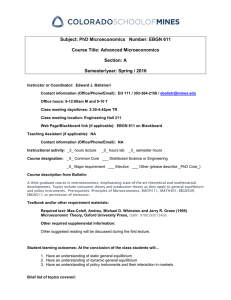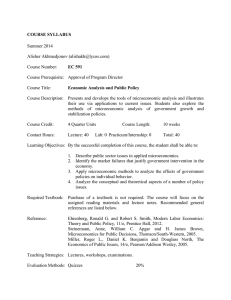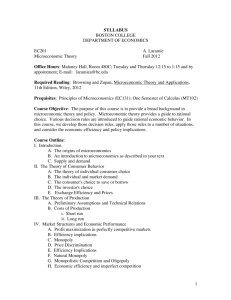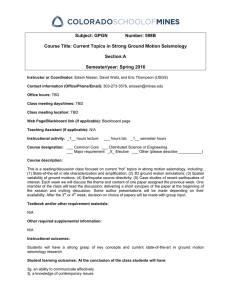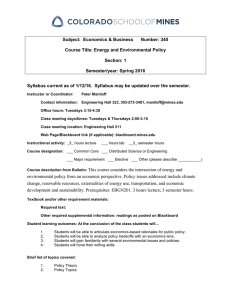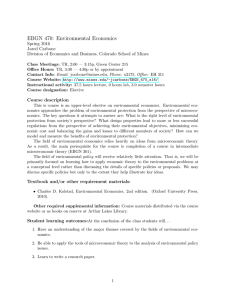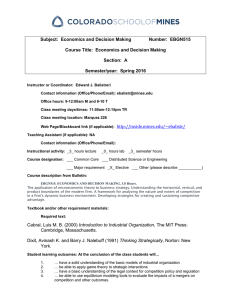Subject: PhD Microeconomics Number: EBGN 511 Course Title: Microeconomics
advertisement
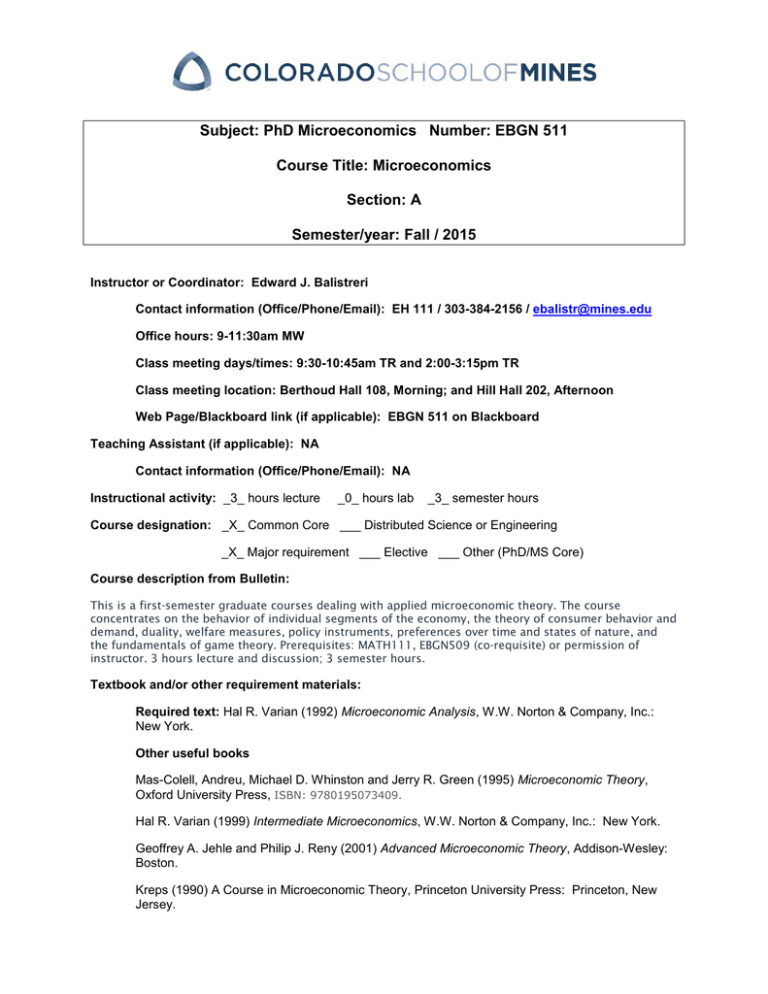
Subject: PhD Microeconomics Number: EBGN 511 Course Title: Microeconomics Section: A Semester/year: Fall / 2015 Instructor or Coordinator: Edward J. Balistreri Contact information (Office/Phone/Email): EH 111 / 303-384-2156 / ebalistr@mines.edu Office hours: 9-11:30am MW Class meeting days/times: 9:30-10:45am TR and 2:00-3:15pm TR Class meeting location: Berthoud Hall 108, Morning; and Hill Hall 202, Afternoon Web Page/Blackboard link (if applicable): EBGN 511 on Blackboard Teaching Assistant (if applicable): NA Contact information (Office/Phone/Email): NA Instructional activity: _3_ hours lecture _0_ hours lab _3_ semester hours Course designation: _X_ Common Core ___ Distributed Science or Engineering _X_ Major requirement ___ Elective ___ Other (PhD/MS Core) Course description from Bulletin: This is a first-semester graduate courses dealing with applied microeconomic theory. The course concentrates on the behavior of individual segments of the economy, the theory of consumer behavior and demand, duality, welfare measures, policy instruments, preferences over time and states of nature, and the fundamentals of game theory. Prerequisites: MATH111, EBGN509 (co-requisite) or permission of instructor. 3 hours lecture and discussion; 3 semester hours. Textbook and/or other requirement materials: Required text: Hal R. Varian (1992) Microeconomic Analysis, W.W. Norton & Company, Inc.: New York. Other useful books Mas-Colell, Andreu, Michael D. Whinston and Jerry R. Green (1995) Microeconomic Theory, Oxford University Press, ISBN: 9780195073409. Hal R. Varian (1999) Intermediate Microeconomics, W.W. Norton & Company, Inc.: New York. Geoffrey A. Jehle and Philip J. Reny (2001) Advanced Microeconomic Theory, Addison-Wesley: Boston. Kreps (1990) A Course in Microeconomic Theory, Princeton University Press: Princeton, New Jersey. Deaton and Muellbauer (1980) Economics and consumer behavior, Cambridge University Press: Cambridge. Other required supplemental information: Other suggested reading will be discussed during the lectures. Student learning outcomes: At the conclusion of the class students will… 1. 2. 3. 3. 4. Have an understanding of consumer choice theory and an appreciation of duality Have an understanding of welfare measures and their role in policy analysis Have an understanding of choice over time Have an understanding of the economic concept of equilibrium Have an understanding of non-cooperative games Brief list of topics covered: 1. Consumer theory 2. Choice over time 3. Game theory Policy on academic integrity/misconduct: The Colorado School of Mines affirms the principle that all individuals associated with the Mines academic community have a responsibility for establishing, maintaining and fostering an understanding and appreciation for academic integrity. In broad terms, this implies protecting the environment of mutual trust within which scholarly exchange occurs, supporting the ability of the faculty to fairly and effectively evaluate every student’s academic achievements, and giving credence to the university’s educational mission, its scholarly objectives and the substance of the degrees it awards. The protection of academic integrity requires there to be clear and consistent standards, as well as confrontation and sanctions when individuals violate those standards. The Colorado School of Mines desires an environment free of any and all forms of academic misconduct and expects students to act with integrity at all times. Academic misconduct is the intentional act of fraud, in which an individual seeks to claim credit for the work and efforts of another without authorization, or uses unauthorized materials or fabricated information in any academic exercise. Student Academic Misconduct arises when a student violates the principle of academic integrity. Such behavior erodes mutual trust, distorts the fair evaluation of academic achievements, violates the ethical code of behavior upon which education and scholarship rest, and undermines the credibility of the university. Because of the serious institutional and individual ramifications, student misconduct arising from violations of academic integrity is not tolerated at Mines. If a student is found to have engaged in such misconduct sanctions such as change of a grade, loss of institutional privileges, or academic suspension or dismissal may be imposed. The complete policy is online. Grading Procedures: Exam 1 (November 3rd) 30points Exam 2 (November 19th) 30points Final Exam 40points Total 100points Students are expected to attend each class and the final exam as scheduled by the registrar. DO NOT MAKE TRAVEL ARANGEMENTS THAT CONFLICT WITH THE SCHEDULE (INCLUDING THE YET TO BE DETERMINED FINAL EXAM DURING THE WEEK OF DECEMBER 14th)! Generally a grade of A is granted for students scoring greater than 92 points, A- for between 92 and 90 points, B+ for between 90 and 88 points, B for between 82 and 88 points, etc. Coursework Return Policy: Exams will be graded and returned to students within two weeks. Absence Policy (e.g., Sports/Activities Policy): Students are expected to attend lectures. Students are responsible for getting notes from other students when an absence is unavoidable. Homework: Problem sets are voluntary and not graded by the instructor. These problem sets are useful practice for the exams. Exams: If you will be absent during a scheduled exam, you should schedule a make-up time before you miss the exam. Common Exam Policy (if applicable): NA Detailed Course Schedule: (Note: it is recommended that the syllabus provide a detailed week-by-week schedule of course activities, including readings, exam and project due dates, etc., as a common courtesy to students.) Week of: Oct. 12: Preferences and the classic consumer problem Oct. 19: Fall Break and EBGN 509 Final Exam Oct. 26: Duality and empirical practicalities Nov. 2 First exam and Intertemporal Choice Nov. 9 Choice over time/uncertainty Nov. 16 Uncertainty continued and Second exam Nov. 23 Equilibrium and competitive games; and Thanksgiving Break Nov. 30 Game theory Dec. 7 Game theory Dec. 14 Final exam week
